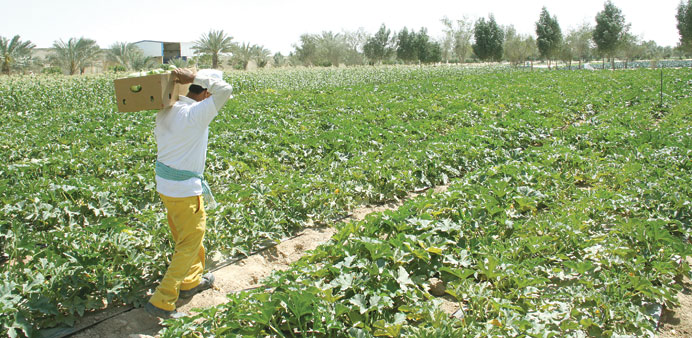By Hamza Jilani/Staff Reporter
Qatar faces stiff challenges to produce food locally as many of the basic requirements for farming are missing in the country. But if there is a will there is a way, a leading Qatari agriculturalist says.
As Qatar’s population continues to grow in sync with its economic ambitions, so do its needs, including the most basic need to survive - food. As of now, Qatar imports more than 90% of its food which leaves only a meagre 10% for home-grown products.
And while Qatar is a rich nation that can afford to import, money isn’t the limiting factor that stunts farming. According to local farming giant Abdullah Salem al-Sulaiteen, the availability of land to farm, the right water sources and the harsh heat are the major factors keeping Qatar ever dependent on imported farm produce.
“Farming is limited in Qatar. While my farm produces some 300 tonnes of fruits and vegetables per year, it’s a lot of hard work that is specific for Qatar,” he explains. “Our farm gets its water from underground wells. But while the water levels continue to drop with salinity proportionally increasing, it simply doesn’t rain enough to fill them back up.”
His farm has desalination plants installed to remove salt from the precious resource along with treatment plants for reuse which allow him to regain 70% of his spent water - and fertilizer. But why go through all the trouble? Why not just use the water from the tap? The answer is almost startling:
“Kahramaa doesn’t provide farms with water, it’s only for domestic use,” al-Sulaiteen says. “We don’t have pipes coming in from their plants, and while we are ready to pay for tap water, they refuse to provide.”
According to al-Sulaiteen, several people in Qatar are not convinced about the need to produce food locally and support buying food from outside.
“But I have seen cases around the world where contracts between countries are signed but fall through when politics come into play. Qatar needs food security. This is how I’m serving my country.”
Farmland is limited in Qatar, he says, and because of the heat, his operations come to a complete halt for three months each year. “The ventilation and cooling systems we use can only do so much, and you can’t overtax them or you’ll operate at a loss more than expected,” he says, adding that there are a total of 1,260 farms in Qatar but only 200 of them produce more than their owners’ needs.
Al-Sulaiteen’s 40-hectare farm which lies in the northern district of Umm Salal Ali - a 20 minute drive outside Doha, officially named as the Al Sulaiteen Agricultural and Industrial Complex, is operated by an estimated 400 expat workers who grow a variety of vegetables and flowers for landscaping - another operation of the Al Sulaiteen Group, the farm’s umbrella organisation. Between 60 and 70% of the combined crops is grown indoors and hydroponically, while the remaining in-soil crop is undergoing gradual conversion.
“Hydroponic growing is easier. You have better control of the water and fertilizer you use and both are much easier to treat for reuse,” al-Sulaiteen explains. Fruits, however, aside from strawberries - which are grown indoors, need a cooler environment to grow.
“We were advised by one of our international competitors supplying Qatar’s markets to try growing oranges but when we tried, they came out very dry inside,” he said. “Farming in Qatar needs Qatar-specific solutions. We’ve made a lot of studies and experiments to get where we are today.”
Al-Sulaiteen says his produce is top quality and sold to top clients including Carrefour, Family Food Centre and Lulu Hypermarket as well as a number of restaurants around town.
Al-Sulaiteen says if he and his team don’t keep up with new technologies for cultivation, housing, water treatment, protection from pests and energy efficient cooling systems, he won’t be able to achieve his dream - and he won’t be able to maintain it.
“Knowledge is everything in this business. If you don’t continuously look for the best practices, the newest solutions and so on, your crop will simply die out,” he said. “It’s that crucial.”
The smiling agro-businessman admits that his farm was originally planned to be a resort for family, friends and tourists - a fact that is clearly seen with children’s play areas set up along with laid-out tennis and basketball courts and even a swimming pool.
“I still receive guests, family and particularly students for education missions, but the original vision for this land changed to what it is now when I realised the capabilities we had here along with the responsibility I had towards my nation and my people to give back,” he says with a proud smile.
“The country’s situation isn’t something we can ignore.”
Al-Sulaiteen is still just as ambitious as always and he is presently looking for land outside Qatar to raise his production for the local market.
“Right now, my team and I are running studies for farm land in Africa - in Sudan, Ethiopia, and other countries. The conditions there are ideal for farming and shipping routes are short enough to send fresh produce to Qatar without the cargo going bad,” he reveals. “There’s always a way.”

A worker harvests one of the crops.
